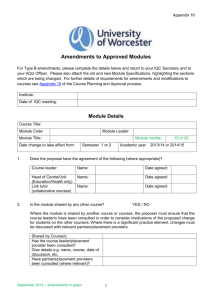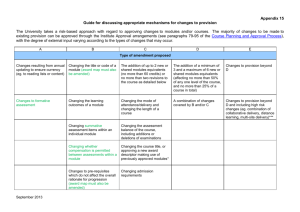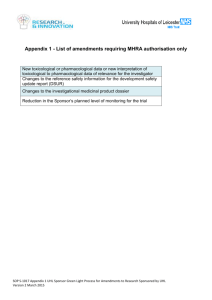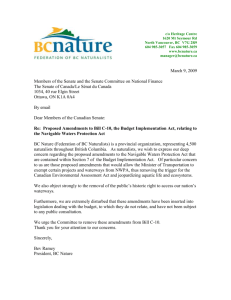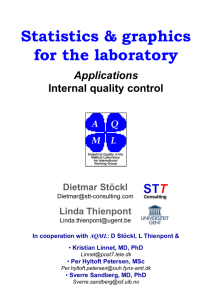Guidance on Amendments to Modules and Courses
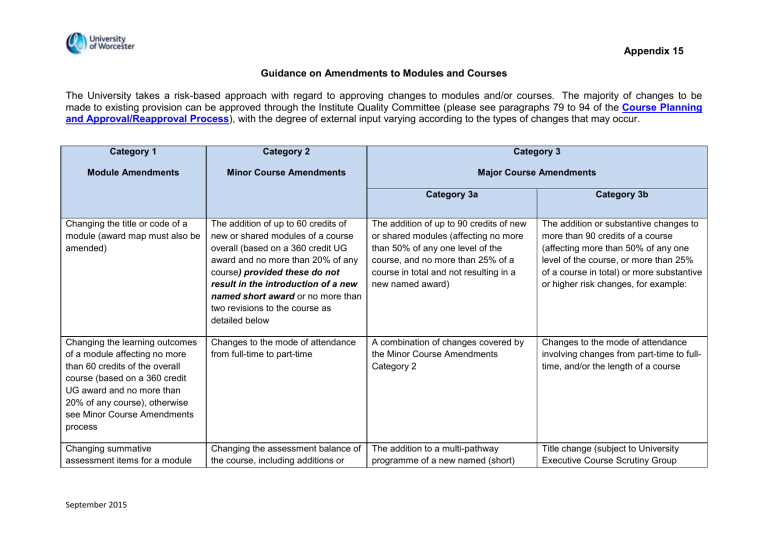
Guidance on Amendments to Modules and Courses
Appendix 15
The University takes a risk-based approach with regard to approving changes to modules and/or courses. The majority of changes to be made to existing provision can be approved through the Institute Quality Committee (please see paragraphs 79 to 94 of the Course Planning and Approval/Reapproval Process ), with the degree of external input varying according to the types of changes that may occur.
Category 1 Category 2 Category 3
Minor Course Amendments Major Course Amendments Module Amendments
Category 3a Category 3b
Changing the title or code of a module (award map must also be amended)
The addition of up to 60 credits of new or shared modules of a course overall (based on a 360 credit UG award and no more than 20% of any course ) provided these do not result in the introduction of a new named short award or no more than two revisions to the course as detailed below
The addition of up to 90 credits of new or shared modules (affecting no more than 50% of any one level of the course, and no more than 25% of a course in total and not resulting in a new named award)
The addition or substantive changes to more than 90 credits of a course
(affecting more than 50% of any one level of the course, or more than 25% of a course in total) or more substantive or higher risk changes, for example:
Changing the learning outcomes of a module affecting no more than 60 credits of the overall course (based on a 360 credit
UG award and no more than
20% of any course), otherwise see Minor Course Amendments process
Changing summative assessment items for a module
Changes to the mode of attendance from full-time to part-time
A combination of changes covered by the Minor Course Amendments
Category 2
Changing the assessment balance of the course, including additions or
The addition to a multi-pathway programme of a new named (short)
Changes to the mode of attendance involving changes from part-time to fulltime, and/or the length of a course
Title change (subject to University
Executive Course Scrutiny Group
September 2015
affecting no more than 60 credits of the overall award (based on a
360 credit UG course and no more than 20% of any course), otherwise see Minor Course
Amendments process deletions of examinations
Changing whether compensation is permitted between assessments within a module
Changing admission requirements
Changes to pre-requisites which do not affect the overall rationale for progression (award map must also be amended)
Changes to pathway requirements
Changes to the teaching and learning hours for a module
(including KIS data)
Changing the level of a module within a scheme award of up to 60 credits using either new or shared modules agreement)
Appendix 15
The introduction of flexible and distributed learning
The introduction or variation to approved off-site or multi-site delivery arrangements
A change in balance of course delivery between the University and a collaborative partner which affects 25% or more of the modules on a course
(subject to University Executive Course
Scrutiny Group agreement)
Introduction of a new pathway Change to compulsory attendance or completion of specific elements of the module
Change to any compulsory professional requirements needed to pass the module
The addition of one new shared module as an option, approved by another course. (award map must also be amended)
Minor module amendments which are proposed to more than 60 credits of a course overall and up to 90 credits in total (based on a 360 credit
UG award and no more than 25% of any course.)
Changes to pathway offers of single, major, joint, minor.
September 2015
Appendix 15
1 2
Amendments to Approved
Modules form (Appendix 16) to be completed and passed to IQC
Secretary and AQU including confirmation that students have been consulted
Amendments to Approved Courses form (Appendix 17) to be completed and passed to IQC Secretary and to
AQU including confirmation that students have been consulted
No external requirement
Comments from External Examiner by correspondence
Rep from a different Institute required not
Rep from a different Institute required, through correspondence if necessary
3a 3b
Amendments to Approved Courses form (Appendix 17) to be completed and passed to IQC Secretary and to
AQU including confirmation that students have been consulted
One external adviser by correspondence, plus External
Examiner comments
(External Advisers must be proposed by the course leader on the
Amendments to Approved Courses form, and agreed by the Director of
Quality and Educational Development).
Rep from a different Institute required
Discuss with AQU and IQC Chair at earliest possible opportunity to establish appropriate mechanism of change
Notes
A combination of alterations may push the mechanism into the next category.
IQCs will ensure that normally all amendments to modules and courses are agreed before students make their Level 5 and Level 6 module selection.
IQC Secretaries will maintain a summary record of all amendments approved by IQC.
The Institute must satisfy itself that proposals to alter a module(s), to share modules, or to approve additional modules, are appropriate and would not alter the structure, aims, outcomes or rationale of the course as a whole. Where such concerns arise, these should be discussed with AQU and the appropriate mechanism of approval determined. Institutes must also ensure that the team have gained approval from other courses which share the module(s) for any amendments.
September 2015
Appendix 15
Following approval of changes, the Module Specification and (where relevant) the Programme Specification/Award Map for the course(s) must be amended. The IQC Secretary will record the change and communicate the details, normally via the revised documentation, to
Registry Services, so that the Student Records system can be updated, and to AQU so that the revised Programme Specification/Award
Map can be uploaded to their website.
September 2015
